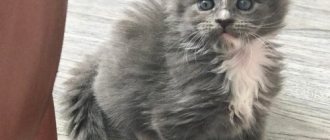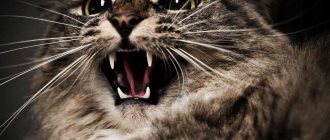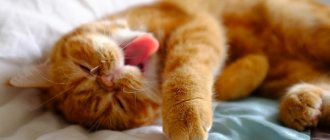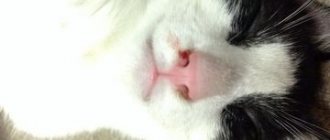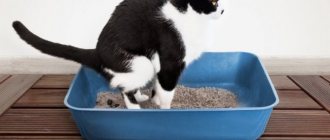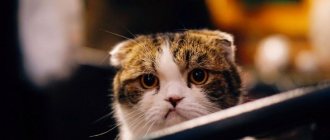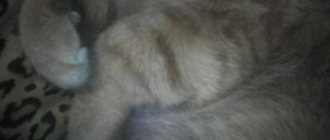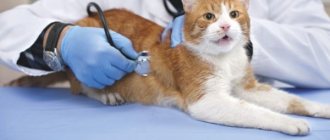If you suddenly see your four-legged pet's whiskers falling out, don't panic right away. This phenomenon sometimes happens within normal limits, but there are times when it is a sign of more serious problems. Therefore, if your cat's whiskers are falling out, first read the information that will help you understand your own opinion.
What are vibrissae
Vibrissae are called cat whiskers. Yes, they have their own official name. Vibrissae are the main organ of touch, and without whiskers, a cat, like without paws, cannot do anything. The mustache grows in groups: first, the longest ones are above the upper lip. Next, the antennae extend under the eyes, on the chin, and on the cheeks.
The most sensitive areas are above the upper lip. They help to perceive information from the outside, orient in space, and are susceptible to weather conditions. Here is the answer to the most important question: “why do cats navigate in the dark so easily?” Yes, because the antennae serve as a kind of companion for them.
The vibrissae are equipped with blood and are connected to the nervous system.
You can use them to judge your cat's mood. If the whiskers are pressed tightly to the muzzle, it means the cat is aggressive. If the antennae are directed forward, then the cat is ready to communicate with you.
Many owners, when they find whiskers at home for the first time, wonder whether cats lose their whiskers. Yes, a cat's whiskers can fall out, and this is normal in exceptional cases. In some cases you will have to undergo treatment.
Vibrissae also grow throughout the body, and can even be found on the pads of the paws.
How can an owner harm a pet?
Very often the owner himself is the cause of the animal’s poor health. He provokes this by doing the following: :
- Mustache plucking.
- Shortening of the vibrissae.
- Trimming your mustache to make it grow faster and thicker.
Such actions can damage the animal's mental state. The cat will have difficulty oriented in space, sleep restlessly, limp, and experience discomfort. A cat's whiskers are removed only if prescribed by a veterinarian. A common reason that forces the use of this measure is ingrown mustaches into the skin or fungal infections.
© shutterstock
Why is it important for a cat to have a whisker?
Mustaches are a huge help in orientation. If the cat does not have a whisker, he will not be able to move around the house calmly. This will cause him difficulties. At night, the cat will not be able to walk at all; due to the darkness and lack of sensation with its whiskers, it will get lost.
Vibrissae also serve as a sensor of movement and sound. They can detect the movements and sounds of mice and catch prey. They can also monitor the owner’s movements around the house.
The vibrissae also analyze various cracks, holes, and openings. When the analysis is successful, the cat will understand where it will get stuck and where it will easily pass. Remember? Cats are liquid!
Street cats are much less fortunate. From such an outcome of events they may even die. She will not be able to catch prey, she will not be able to calculate the jump. The cat is either doomed to starvation, gets stuck in some narrow passage, or falls from a tall tree.
You can forget about a cat’s peaceful sleep, just like your own sleep. Eternal stress, that something is missing, leads to nervous breakdown.
Life won't end there, but it will become terribly difficult for both the cat and the owner.
What is the risk for a cat losing its whiskers?
Of course, without a mustache, a pet will not die. But this will complicate its orientation in space. Especially at night. For a pet who lives at home, the absence of a mustache will not do much harm. The same cannot be said about cats that live on the street. Studies have shown that a pet without a mustache is disoriented in space. In particular, this is caused by the animal's inability to determine the distance to an object. When jumping, the cat may not calculate its strength and miss.
Causes of whisker loss in cats
Why does a cat's whiskers fall out? There are many reasons for this, both bad and not so bad. The most common bad reasons are:
- Avitaminosis. When a cat's body lacks vitamins A and D, collagen and microelements, whiskers may fall out. In this case, everything is connected with nutrition. Bring your diet back to normal.
- Parasitic diseases. If the focus of inflammation by parasites is near the muzzle, then it is quite clear that the mustache will not remain in place. The symptom is itching.
- Hormonal background. Either the cat will be hyperactive or lethargic. Here it is worth consulting a doctor.
- Allergy. It can be for food, for external circumstances. Conduct an examination, change your diet.
- Thyroid. Hypothyroidism causes whiskers to shed.
- Diabetes.
- Problems with the gastrointestinal tract.
- Metabolic disorders.
The main thing is not to panic and take a closer look at your animal. Observe his behavior.
If the loss of whiskers is associated with abnormalities due to hypothyroidism, then the following symptoms can be identified in the cat:
- The coat will no longer be as shiny and silky. It can fall out a lot.
- The pet becomes nervous or begins to behave too actively.
- The cat will eat a lot and drink a lot, but the weight will only decrease.
If the animal is tormented by parasites, then the area near the antennae will be combed.
With diabetes, a pet often runs to the toilet and eats a lot.
Allergy symptoms include itching, hair loss, increased salivation, redness of the mucous membranes, and discharge from the eyes.
If metabolic processes are disrupted, body temperature will increase.
OLYMPUS DIGITAL CAMERA
Traumatic factors
Having seen that the kitten’s whiskers have become shorter or disappeared completely, it is necessary to exclude traumatic factors.
- Biting off whiskers by other kittens or pets.
- Exposure to open fire. Often an inexperienced kitten, trying to explore an unfamiliar object, comes too close to a gas burner or a burning fireplace. In this case, singed hairs on the muzzle and whiskers above the eyes are also usually noticeable.
- Children's "pranks". Young children may unknowingly harm their “living toy” by cutting or plucking its whiskers.
Note! If there is a child in the house, then he should be told in advance about the rules of behavior with a kitten.
Norms for loss
Most often, antennae fall out not due to any abnormalities in the body. Adequate reasons could be:
- Change of antennae. They also cannot last forever and gradually wear out. Therefore, this is a natural change of vibrissae. If the above symptoms are not present, then there should be no cause for concern either. New ones will definitely grow in place of the old antennae.
- During a game or fight. You may not notice how during a super active game, embarrassment occurs and the mustache can easily get lost. And in a fight, the cat will not spare the opponent, so the loss of whiskers is a normal reaction here too.
- Fire. Many people have cats who curiously look at the fire near the stove or at a campfire in nature. Due to burning, the tendril will fall off over time.
By the way, there have been cases when the mother cat herself chewed off the children’s whiskers so that they would not misbehave.
Why do cat whiskers break?
In addition to the above symptoms, mustache fragility can be caused by:
- Environment.
- Terrible food and care.
- Lack of vitamins and minerals.
- Weather.
- Dehydration.
By the way, sphinxes' antennae naturally tend to break. They can grow straight, but over time they will break off again. This is the nature of sphinxes.
Vomiting and diarrhea, bad breath may indicate a worse case scenario.
Why does a cat's whiskers fall out or break?
In the article I will look at the main reasons why whiskers break in kittens and cats, as well as those leading to their loss. I’ll tell you how to prevent such a situation and how to help the animal cope with the problem that has already arisen. Why and from what diseases a mustache can fall out and break off and what to do for treatment.
A cat's whiskers, or, scientifically, whiskers, are the most important tactile organ, transmitting commands to the brain through nerve endings.
The vibrations felt by the whiskers allow cats to navigate in space and determine the safety or temperature of prey.
As they grow older, a cat's whiskers behave like baby teeth, breaking and being renewed after a planned loss. In other cases, it is important to determine the cause leading to problems with the mustache and eliminate it in time.
Cat whiskers can break and fall out, being replaced by new ones as the kitten grows up.
In cats and cats
Adult cats that have gone through a change of whiskers suffer from their loss for the following reasons:
- Allergic reactions. The saliva released from a flea bite contains a protein that is incompatible with the protein structure of the cat's body. Food allergies are also a danger.
- Fungal infections and parasites that weaken the body. In addition to helminths and fungi, lice eaters that eat mustaches have a detrimental effect.
- Dry air. The problem increases in the cold season after turning on the heating.
- The struggle for leadership. Having several cats in the house often leads to fights. Animals, trying to prove their superiority, fight and break off their whiskers.
- Unbalanced diet. Cheap dry food and the lack of mineral and vitamin complexes have a detrimental effect on the immune system.
- Frequent bathing. The problem is aggravated when choosing low-quality shampoo, which injures the skin and leads to dandruff.
- Hormonal disorders. Thyroid dysfunction affects not only the weight of the animal, but also the fragility of the hair.
- Disorders of the renal and urinary system (ICD, renal failure).
- Breed peculiarity. Hairless cats tend to lose their whiskers profusely.
- Lack of fluid. A small amount of water consumed by a pet threatens not only the loss of whiskers, but also a number of other unpleasant diseases.
Powdered milk and shelf-stable cottage cheese from the store are not acceptable in a cat's diet. Breaking whiskers in cats may be the result of an allergy or fungus
In kittens
The loss of whiskers in a kitten depends on:
- adolescence;
- mineral balance disorders;
- the presence of worms and fungal infection;
- inept handling during children's games;
- the mother cat, showing her authority by breaking off the whiskers;
- excessive curiosity leading to adventures with undesirable consequences.
Explain to young children the rules for interacting with animals to prevent injury. Kittens can lose or break their whiskers during play.
After a clinical examination and tests, the animal will be diagnosed and the correct treatment will be prescribed.
Loss of whiskers is an important symptom that accompanies a variety of diseases, so it is important to determine the exact cause.
Typically, therapy includes:
- anthelmintics and antiparasitics, which help get rid of parasites;
- antihistamines, eliminating allergic reactions;
- antibiotics that fight infections;
- vitamins and minerals that help restore immunity.
It is equally important to normalize the living conditions of the pet, due to which the whiskers may fall out:
- Eliminate excessive dryness in your room using a humidifier.
- Shorten your baths and change your shampoo.
- Buy fatty acids, biotin and taurine. Strictly follow the dosages prescribed by your doctor. Excessive amounts of vitamins will lead to new problems.
- Eliminate stress factors. Stop negative relationships in the cat community.
- Switch to quality food. Remember that changing feeds occurs gradually by mixing a new option into the old one.
- Keep an eye on your water balance. Use any tricks, but ensure sufficient fluid intake.
A cat that has lost its whiskers is unable to navigate in a dark room, and checks the temperature of food with its paw. For prevention, you need to stop giving your pets cheap dry food
For a thick mustache, follow these recommendations:
- You can't trust cheap food. An unclear composition, at best, will simply not bring any benefit, and at worst, it will cause food intolerance and destroy the immune system.
- Stick to your pest control schedule. Remember to use anthelmintic drugs.
- Process raw meat and fish before serving. Heat treatment will destroy worm eggs.
- Avoid competition for leadership. Protect the kitten from aggression from older family members.
- Be sure to include vitamins in your diet when feeding naturally.
- Strictly monitor the amount of water consumed when dry feeding. Lack of fluid can lead to the development of urolithiasis.
- Visit your veterinarian for preventative purposes at least once a year.
Never trim your cat's whiskers. Any length that seems excessive is suitable for this member of the family.
In conclusion, I note that the mustache is an important organ, the condition of which must be carefully monitored. Follow these tips and try to avoid causes that can harm your cat's whiskers.
A cat's whiskers (vibrissae) are an important organ that performs the function of touch. They are connected to nerve endings and are capable of transmitting certain signals to the animal’s brain. The vibrations of the surrounding world, which a cat can feel with its whiskers, allow it to navigate, determine safe routes or the temperature of food. A cat’s whiskers are not an ornament, but an important sensory organ.
We suggest you read: How and what to feed the Pekingese, making the right choice
As a cat matures, it is characterized by a change of vibrissae, like baby teeth. All other cases where problems with the mustache are observed are caused by some kind of pathology. It is important to immediately determine the cause and stop the development of the disease.
The reasons why an adult cat that has already gone through a scheduled change of whiskers may lose its whiskers are the following:
- Allergy. Whiskers may fall out due to an allergic reaction, which can be triggered by an insect bite, food or chemical exposure.
- Fungi and parasites. Helminths and fungi weaken the animal's body, as a result of which the whiskers may fall out or become brittle. Whisk eaters can also harm vibrissae by simply eating them.
- Lice eaters in cats are insects that feed on scales that peel off from the animal’s skin during its life.
- Dry air in the room where the pet lives. This is especially true when heating is turned on in apartments.
- Fights between pets. Multiple cats in a household, especially cats of the same sex, may fight. During fights, the mustache can break.
- An imbalance in nutrition leads to a weakened immune system, as a result of which the cat may lose its whiskers.
- Frequent water procedures. The problem may lie in the wrong choice of bathing product. For example, shampoo can cause dry skin and make your mustache brittle.
- Hormonal disorders. When an animal's thyroid gland doesn't work properly, it can cause hair breakage.
- Peculiarity of the animal's breed. For example, hairless cats lose their whiskers profusely. Hairless cats may not have whiskers at all.
- Dehydration. When an animal drinks little, it can threaten not only the loss of its whiskers, but also other pathologies.
A kitten may lose its whiskers due to the following reasons:
- adolescence (natural change of vibrissae);
- disturbances of mineral balance, vitamin deficiency;
- the presence of worms, fungi, parasites;
- careless play of family members (for example, children) with the pet;
- active games between kittens;
- establishing the authority of the mother cat, who herself bites the kittens’ antennae;
- excessive curiosity leading to unpleasant consequences.
I have had many cats that have given birth to kittens at different times. But I never had a chance to pay attention to their bitten mustaches. Although they say this is a fairly common phenomenon. But I am familiar with the loss of whiskers in cats when changing. I have a collection of these antennae (they were discovered during cleaning).
Why do kittens' whiskers fall out?
Even at an early age, kittens can suffer from whisker loss. For them, some things are also considered normal, and some are considered a serious illness.
- The transitional age suggests that it is time to replace the old ones with new vibrissae.
- Vitamin deficiency also occurs in small children due to poor nutrition from infancy.
- Parasites affect everyone. These bad boys' mustaches don't last long.
- A game in which the antennae are lost.
- A cat mother's training process to keep her kittens in one place.
- Curiosity.
Kittens are no exception to loss of whiskers. They, like adults, suffer from loss, so increased attention is required from an early age so that this does not lead to irreversible consequences. Small kittens get sick very quickly.
When you bring a kitten home, do not expose it to danger and do not let it get sick.
What is the structure of the mustache?
The base of the mustache is located in the layer of skin that is on the surface. They are well supplied with blood - the root of the sensitive mustache is located in a blood vesicle, which is called a blood lacuna or sinus. Branches of the facial nerve approach those whiskers, which are called vibrissae.
The slightest changes and fluctuations in the environment cannot go unnoticed by the cat - even the lightest touch on the whisker is transmitted to the root, where the nerve endings surrounding it instantly send information to the brain.
A cat's whiskers are not just for beauty. They take part in the formation of sensory areas of the brain, in which each vibrissa has, as it were, its own representation as a sensory organ.
Important!
Why do a cat's whiskers and vibrissae move? They gained the ability to move thanks to the contraction of striated muscles. Remember how funny a cat can move its “eyebrows” or whiskers on its face.
What to do if a cat or kitten loses its whiskers
What to do if your cat's whiskers fall out:
- First, evaluate your pet's sensations. Monitor your symptoms. If you notice consequences, the main thing is not to panic.
- Even if you yourself have identified the symptoms, you should not self-medicate, but rush to the doctor.
- When you visit the veterinarian, the doctor will take all the tests, your pet will be fully examined, and only then the veterinarian will prescribe treatment.
- Next, you will need to follow all the doctor’s recommendations and care for your animal in accordance with the prescription.
Don't try to help your cat by trimming his whiskers. This is a deep misconception. This will only make things worse.
Parasitic diseases
Loss of vibrissae may be a symptom of notoedrosis, caused by the microscopic parasite Notoedres cati.
Important! The mite that causes notoedrosis in cats is easily transmitted to humans and other animals. Therefore, when treating a kitten, it is necessary to strictly observe safety precautions and hygiene rules, and also protect children and pets from communicating with it as much as possible.
In addition to whisker loss in kittens, this disease has the following symptoms:
- scratching in the area of the muzzle and ears;
- alopecia;
- redness of the affected areas of the skin;
- peeling;
- thickening of the skin with the formation of crusts.
Lack of treatment leads to damage to the entire body, followed by death.
Pet care, maintenance, treatment and prevention
Types of treatment may vary depending on the disease.
- If the problem lies in nutrition, then the cat will be prescribed a diet that will either get rid of whisker loss or add vitamins to the body.
- If you have an allergy, you must follow the doctor’s instructions and exclude the pathogen that caused the hair loss. Perhaps the cat is allergic to shampoo, which means it will have to be excluded from washing. It is also advisable to put away chemicals that are used in everyday life.
- Poor quality materials in toys, scratching posts and beds cause shedding. So make sure you have good products for your pet.
- For thyroid disease, hormonal tablets are prescribed.
- Feed your cat only high-quality foods that contain all the beneficial vitamins and microminerals. Eliminate cheap and highly popular products like Kitekat or Whiskas.
- Vaccinate your cat on time against various pathogens. Treat fur, leather and external surfaces. Do not walk your cat if you are not sure of its protection.
- Water is the source of life. Your cat should always have access to water.
- If your house is dry, get a humidifier or constantly ventilate the room.
- The most important factor is to visit the doctor not “when necessary,” but regularly, for examinations and vaccinations.
- Never trim your mustache yourself. This is strictly prohibited!
The pet's condition rests entirely on your shoulders. Don't neglect your responsibility and love your pet.


